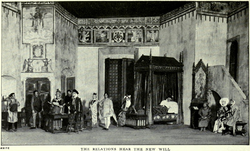Gianni Schicchi
| Work data | |
|---|---|
| Title: | Gianni Schicchi |
| Original title: | Gianni Schicchi |

Production design: Reading of the will, Metropolitan Opera |
|
| Shape: | Opera in one act |
| Original language: | Italian |
| Music: | Giacomo Puccini |
| Libretto : | Giovacchino Forzano |
| Literary source: | Episode from the Divine Comedy by Dante Alighieri |
| Premiere: | December 14, 1918 |
| Place of premiere: | Metropolitan Opera New York |
| Playing time: | about an hour |
| Place and time of the action: | Buoso Donati's house in Florence , 1299 |
| people | |
|
|
Gianni Schicchi [ ˈd͡ʒanːi ˈskikːi ] is an opera in one act by Giacomo Puccini . It is based on an episode of the Divine Comedy by Dante Alighieri , the libretto is by Giovacchino Forzano . Gianni Schicchi was combined with the one-act plays Il tabarro and Suor Angelica to form the three-act opera Iltretico ("The Triptych"). The joint premiere took place on December 14, 1918 at the Metropolitan Opera in New York City .
Emergence
With the Trittico, Giacomo Puccini wanted to offer the audience a tragic (Il tabarro) , a lyrical (Suor Angelica) and a cheerful piece (Gianni Schicchi) in one evening.
In 1917 the librettist Giovacchino Forzano Giacomo Puccini presented the books for Suor Angelica and Gianni Schicci . After Puccini had completed the tragic-lyric one-act act Suor Angelica , he immediately began composing the opera buffa Gianni Schicci . The basis was verses 32 ff. In the 30th song of the Inferno about Gianni Schicchi, who rages as "goblin" or "poltergeist" (Italian folletto ) in the eighth circle of hell, who pretends to be Buoso Donati and forges his will to secure the best horse from its stable. After the world premiere, Iltretico was rarely performed as a complete work; Gianni Schicchi is performed much more often as a single opera, not least because of the famous aria O mio babbino caro (“O my beloved father”), sung by the daughter of the title character in the middle of the piece.
action
The opera is set in Florence in 1299.
- Location: in Buoso Donati's house:
With hypocritical sympathy, the greedy relatives are gathered around the bed in which the dead Buoso Donati lies, and mourn his passing. When she finds the will of the head of the family, it becomes clear that he has disinherited her: he has bequeathed all of his property to a monastery. Everyone is thinking about how the will could still be interpreted in their favor. The saddest are Lauretta and Rinuccio, who are madly in love with each other. Without the inheritance, Rinuccio never gets permission from his aunt Zita to marry Lauretta, the daughter of Gianni Schicchi. In the eyes of the high-born relatives, the latter is only a poor newcomer, an upstart. If he were rich, it would look a little different. Schicchi is now also coming into the house. In the aria O mio babbino caro , his daughter Lauretta threatens him with suicide if he does not help to save the inheritance and thus the wedding:
|
O mio babbino caro, |
O my beloved father, |
Since the city does not yet know that Donati has died, the wily Schicchi finds a way out. He wants to lie down in his death bed and dictate a new will to the notary, as Donati. The doctor who is about to visit Donati is sent away again. He is told that Donati is sleeping.
Almost everyone in the family is now trying to bribe Gianni Schicchi to "convince" him to bequeath the best piece of the inheritance to him. Schicchi disguises himself as Donati and goes to bed in the darkened room. He admonishes everyone to keep quiet, because in Florence at that time forgery of wills was punished with the loss of a hand and banishment, and has the notary called. The fake Donati distributes the property among the relatives in front of the notary, but bequeaths most of it to himself, as the “best friend” of the deceased. When the cheated heirs want to express their anger at Schicchi after the notary's departure, he chases them out of the house, since it now belongs to him; only the happy lovers remain behind.
Performance history
The world premiere of Trittico on December 14, 1918 in the order Il tabarro , Suor Angelica and Gianni Schicchi at the Metropolitan Opera in New York City was well received by the audience. The conductor was Roberto Moranzoni, on stage a. a. Claudia Muzio , Geraldine Farrar , Flora Perini and Luigi Montesanto with. Due to the travel difficulties in the post-war period, Puccini himself was not present. The first performance in Puccini's home country Italy followed on January 11, 1919 at the Teatro Costanzi in Rome . The performance was a success, especially the enjoyable Gianni Schicchi was celebrated by the audience. Performances in Buenos Aires, Rio de Janeiro and Chicago followed in the same year . Performances in German-speaking countries followed, in a translation by Alfred Brüggemann , on October 20, 1920 at the Vienna State Opera and in 1921 in Hamburg. In 1928 the opera was played at the State Opera in Berlin .
Web links
- Gianni Schicchi : Sheet music and audio files in the International Music Score Library Project
- Gianni Schicchi (Giacomo Puccini) in the Corago information system of the University of Bologna
- Plot and libretto by Gianni Schicchi in German translation and the Italian original at Opera-Guide
Individual evidence
- ^ Ernst Krause: Opera - An opera guide. 3rd edition, Deutscher Verlag für Musik, Leipzig, p. 403.
- ^ Inferno XXX 32 ff .; German from Philaletes 1839, p. 246 books.google as well as divina-commedia.de .